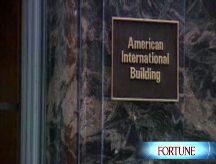The meltdown
Lehman files for bankruptcy. Merrill is bought by Bank of America. The Fed and major banks expand lending. Anxiety lingers.
NEW YORK (CNNMoney.com) -- Wall Street was a vastly different world Monday from what it looked like just days earlier, following one of the most harrowing days in the history of U.S. financial industry.
Just a day earlier, Lehman Brothers, one of the nation's oldest investment banks, filed for bankruptcy - the largest ever announced in the United States. And Bank of America executed a bold and swift $50 billion takeover of Merrill Lynch, while the fate of other brand-name financial institutions remained in doubt.
Anxiety was palpable in the financial community all day Monday. The Dow Jones industrial average suffered a painful selloff, falling more than 500 points - its worst decline in more than seven years. (More)
Driving much of the fear was a decision by Lehman to file for bankruptcy under Chapter 11 with the U.S. Bankruptcy Court for the Southern District of New York. (More)
The firm, whose fate was in doubt for much of last week, made its intentions known shortly after midnight as talks aimed at saving the 158-year-old firm failed.
Lehman (LEH, Fortune 500) shares, which had lost 94% of their value this year as of Friday, were nearly worthless after markets closed Monday.
Different divisions of Lehman offered reassurances to nervous clients during the day. Still, both analysts and rating agencies slashed their assessment of the once-mighty investment bank.
Lehman's dramatic collapse concluded what proved to be a long weekend for top Wall Street executives and regulators, who held marathon talks to try to craft a rescue plan for the embattled investment bank. Over the past six months, the firm has lost close to $7 billion dollars because of bad bets on both the housing and commercial real estate markets.
Many had hoped a buyer would emerge by Sunday night, most notably the British bank Barclays or Bank of America. Instead, both suitors pulled out, with Bank of America (BAC, Fortune 500) instead entering merger talks with the brokerage giant Merrill Lynch (MER, Fortune 500). By early Monday, the two had announced that BofA had bought Merrill for $50 billion in stock.(More)
Merrill, known for with its famous bull logo, has been an icon of Wall Street and investing in America. Still, billions in losses in the last year due to fallout in the U.S. mortgage market proved too much for the 94-year old firm.
Certainly, the disappearance of Merrill Lynch and Lehman will result in heavy job losses in the already hard-hit financial services industry. (More)
Lehman Brothers employees, which totaled some 26,000 as of the end of June, were seen carting off their belongings from corporate headquarters in midtown Manhattan as early as Sunday evening. Still, company officials at either Lehman or Merrill provided little indication about how many jobs would be lost as a result of Monday's announcement.
Wall Street firms have lost close to 10,000 jobs, or more than 5% of the work force, so far this year, according to the latest figures from the New York State Department of Labor.
And the fears were not isolated to Lehman. Investors found themselves knee deep in other concerns.
The insurance giant American International Group (AIG, Fortune 500) raced to raised cash Monday in order to avoid credit rating downgrades. Shares of the New York City-based firm lost close to two-thirds of their value Monday as the market nervously waited for the company to announce a restructuring plan. The move, which was rumored as early as Sunday evening, is expected to include a sale of part of its business to raise desperately needed cash and boost investors' confidence, according to published reports. (More)
Meanwhile, the federal government has asked Goldman and JPMorgan Chase to head up a $70 billion to $75 billion lending pool for AIG, the Wall Street Journal reported.
Washington Mutual (WM, Fortune 500), the nation's largest savings-and-loan, saw its shares finish 27% lower, amid concerns that it might not have enough capital to ride out the crisis. (More)
And worries about the long-term prospects of the Wall Street business model helped sink both Morgan Stanley (MS, Fortune 500) and seemingly invulnerable Goldman Sachs (GS, Fortune 500), as shares of both investment banks lost 14% and 15% respectively.
Other major financial institutions took pre-emptive steps Monday to try and calm both investors and employees.
Citigroup (C, Fortune 500), which has been one of the hardest hit firms in the ongoing credit crisis due to billions of dollars in losses, stressed the underlying health of the firm Monday morning.
In an internal memo to all Citigroup employees, newly installed CEO Vikram Pandit reiterated the firm's strength and previously announced restructuring efforts aimed at righting the troubled financial firm.
"We are confident about the future despite a very challenging time," Pandit said.
Hoping to provide some comfort to Main Street, President Bush acknowledged the market turmoil Monday, but said that the government was working to correct the problems. (More)
"We are working to reduce disruptions and minimize the impact on the [broader economy]," said Bush, speaking at the White House Rose Garden.
Sunday's news also garnered attention from the campaign trail, as both candidates weighed in. (More)
Sen. John McCain praised the Fed and the Treasury for avoiding engaging in a bailout of Wall Street, blaming the Lehman collapse on "ineffective regulation and management." Sen. Barack Obama called the developments "troubling," stressing the need to modernize regulation that oversees both Wall Street and broader financial markets.
Nevertheless, this past weekend's developments are certain to have very real consequences for everyday Americans. Having suffered billions of dollars in losses and more looming ahead, financial institutions will most likely make it more difficult, and more expensive, for small businesses and consumers and to gain access to credit including mortgages, auto loans and credit cards. (More)
The Lehman and Bank of America-Merrill news, while important, proved not to be the only development over the weekend.
In order to try and calm the markets, the Federal Reserve announced plans late Sunday to loosen its lending restrictions to the banking industry. (More)
The Fed said it would expand its short-term lending to banks by starting to take all investment-grade debt as collateral - instead of just Treasurys and other high-grade securities.
"The steps we are announcing today, along with significant commitments from the private sector, are intended to mitigate the potential risks and disruptions to markets," said Fed Chairman Ben Bernanke.
Similarly, a consortium of 10 leading domestic and foreign banks had agreed to create a $70 billion fund to lend to troubled financial firms. The group, which included, among others, Goldman Sachs (GS, Fortune 500), Citigroup, Barclays and Morgan Stanley, agreed to pony up $7 billion each to create a $70 billion lending pool to help troubled institutions.
Treasury Secretary Henry Paulson, who has helped spearhead efforts to help get the U.S. housing market and the broader economy back on track, applauded the steps taken by regulators and top banking executives over the weekend.
The former Goldman Sachs chief said at a press conference in Washington Monday that he had no regrets about not taking steps to rescue Lehman Brothers.
"I never once considered that it was appropriate to put taxpayer money on the line when it came to Lehman Brothers," Paulson said.
Following the bailout of Bear Stearns in mid-March, top banking regulators, including the Federal Reserve, faced heavy criticism from lawmakers for just that reason.
As part of JP Morgan Chase's (JPM, Fortune 500) purchase, the Fed agreed to put taxpayer funds at risk by guaranteeing $29 billion's worth of potential losses on Bear Stearns' portfolio.
And just a week earlier, federal officials, including the Treasury, undertook one of the biggest bailouts in U.S. history by agreeing to take over the twin mortgage buyers Fannie Mae and Freddie Mac as part of an effort to prop up the U.S. housing market.
But Paulson didn't rule out future bailouts in the financial services industry. When a reporter asked Paulson if there would be "no more" bailouts, he replied: "Don't read it as no more. Read it as that ... it's important, I think, for us to maintain the stability and orderliness of our financial system." ![]()






